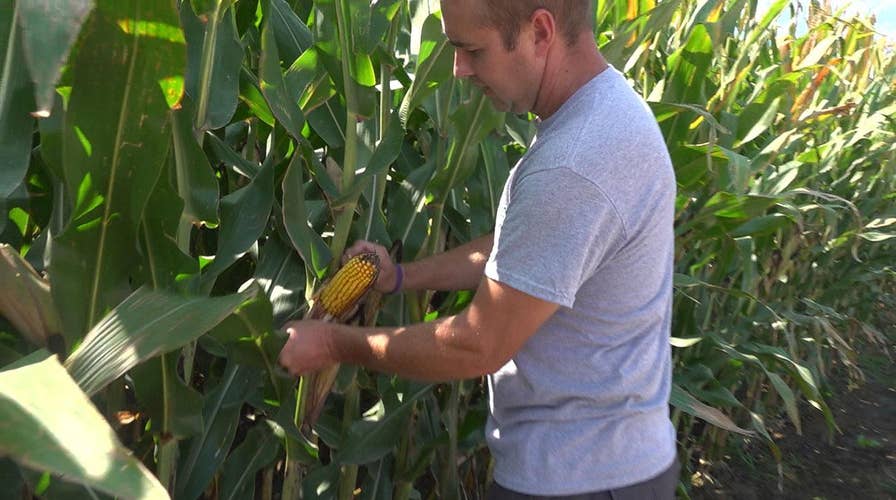Midwestern farmers eye USMCA deal for relief amid China trade war
Uncertainty within the market is why some farmers in Nebraska are urging Congress to pass the proposed tradedeal known as the United States Mexico Canada Agreement (USMCA).
VALLEY, Neb. --Another day and unsure of the next dollar.
That’s the sentiment of Ryan Ueberrhein, a farmer in Nebraska who says the current trade tariffs are hurting his bottom line. The uncertainty is forcing him to find new ways to stay financially afloat.
“You might have to delay equipment replacement, try to find cheaper seeds or do things a little differently than you would normally do just to make the cash flow work,” said Ueberrhein.

Ryan Ueberrhein, a farmer in Nebraska who says the current trade tariffs is hurting his bottom line. PHOTO|MITTI HICKS FOX NEWS
According to a recent report from the Nebraska Farm Bureau, the international tariffs are costing farmers in the state $943 million in lost revenue. The projected losses would be in addition to tariff-related losses in farm-level income estimated between $695 million to $1.026 billion in 2018, according to the report.
Beyond Nebraska, Midwest farmers are also feeling the strain as bankruptcies skyrocket. Data from the American Farm Bureau Federation published in July showed delinquency rates are at a six-year high for commercial agricultural loans in both the real estate and non-real estate lending.
Wisconsin, Kansas, and Minnesota are leading the nation in Chapter 12 filings. Bankruptcy filings in Kansas and Minnesota increased so significantly in the past year that they reached the highest levels of the past decade, according to the report.
That’s why farmers like Ueberrhein hope Congress will bring some stability by approving the United States Mexico Canada Agreement (USMCA).
The USMCA is a replacement for NAFTA that aims to “modernize” and bring NAFTA into the 21st century.
“One of the most important things that the USMCA does is that it protects our markets that we already have in Canada and Mexico. Canada and Mexico are our two largest trading partners,” said Jay Rempe, senior economist for the Nebraska Farm Bureau. “It will provide farmers, ranchers and other businesses who want to do business with these countries certainty that they know what the rules are.”

Nebraska is known as the "Cornhusker State" and is the third-largest corn-producing state in the United States. PHOTO|MITTI HICKS FOX NEWS
Farmers said they hope USMCA boosts their struggling industry.
"It will be a step in the right direction. At least we can get a deal done with our two neighboring countries," Ueberrhein said, noting that adding Mexico will provide a critical lifeline. "That will be huge for us by opening up that avenue and keeping it going."
Democrats have voiced concern about the new agreement’s labor and environmental provisions, but Iowa State University Professor Chad Hart cautions that if the bill doesn’t pass, it could have effects beyond American soil.
CLICK HERE TO GET THE FOX NEWS APP
“We’re sort of holding the rest of the world up,” he said. “Our economic expansion is helping the global economy try to chug through. If we go into a recession, the rest of the world tends to follow.”
As for Ueberrhein, he's banking on today’s struggles for later success.
“It probably will happen sometime again in my lifetime," he said, "to where we learn from this and we’re better prepared."





